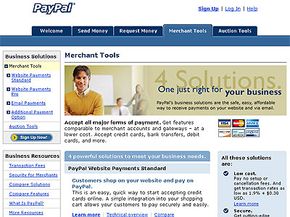How to Set Up E-Payment for Your Business
Let's say you have a small business and you want to set up online payments via your Web site. Your first decision is whether to outsource your payment solution or handle it in-house. For those who want an all-in-one solution, services like PayPal and ProPay make it easy for you to accept credit cards and other forms of electronic payment from your site. When a customer enters his or her information on your site, your payment service authorizes the transaction and transfers funds to your account. These services charge a processing fee per transaction.
If you prefer to process payments in-house, the first thing you need to do is set up a secure server. This is a computer that uses encryption to make it difficult for intruders to intercept confidential information. Secure Socket Layer (SSL) technology is used to encrypt the data. You can apply for an SSL certificate online.
Advertisement
Once you have an SSL certificate, you need to register your site with a digital authentication service. A digital certificate validates that the site receiving your customers' information is the correct one. It assures customers that your site is legitimate and that their information is encrypted.
Now that you've a secure server, you'll need to build or buy shopping software that allows a customer to choose products from your site and add them to a virtual shopping cart. When customers are ready to complete their orders, they click on a "checkout" link that takes them to your secure server, where they enter their credit card information.
Finally, you need a system to process credit card payments and an Internet merchant account with a bank. Credit card payment processing services are available through online companies such as Verisign. They provide you with software that validates your customer's credit card information over your secure server. Some businesses also choose to accept electronic checks from customers.
Another potential source of information is the National Automated Clearing House Association (NACHA), also known as the Electronic Payments Association. Let's look next at what this group does and the help it offers consumers and small businesses.
